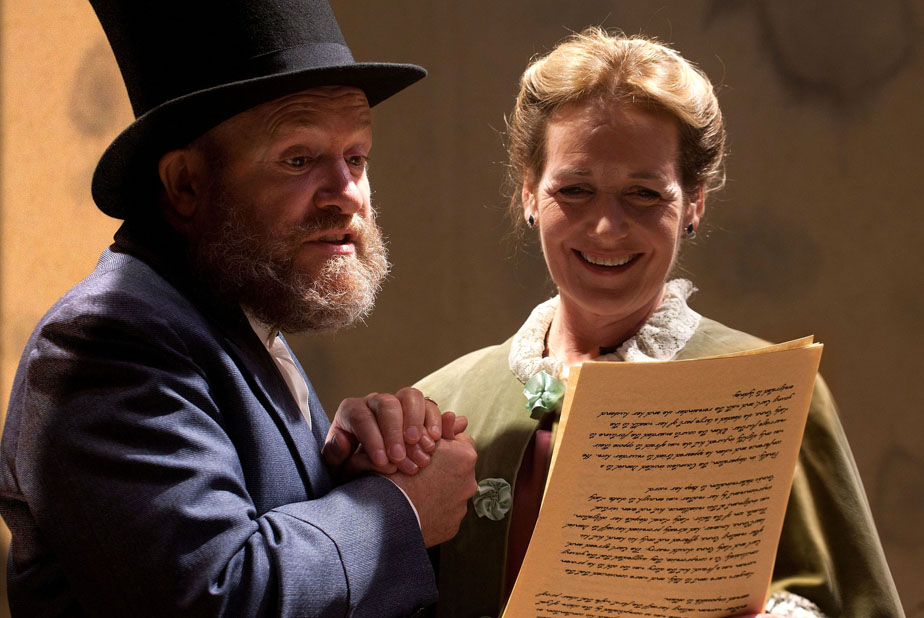
To commemorate Anthony Trollope’s 200th birthday, Craig Baxter was commissioned by the Trollope Society to write a dramatized version of Lady Anna. Seldom read today, this is a conventional Victorian tale of a young woman of noble birth who must choose either to be wedded off to a young earl who matches her in social status but whom she does not love, or to marry her childhood sweetheart, a poor tailor.
A highly productive writer with very regular work habits, Trollope began writing Lady Anna while sailing to Australia on the SS Great Britain, and the whole thing was finished before they docked in Melbourne. Lady Anna has moments of high drama, but much of it is concerned with rather long-winded and somewhat less than exciting disputes between two sets of lawyers. Recognising that a straightforward re-telling would be rather heavy going, Baxter has taken key scenes from the original narrative and intercut these with an account of Trollope’s conversations with his fellow passengers, including his wife and the family maid. These transitions are very rapid, with the cast of seven actors each playing a character or two from both settings. Rhiannon Handy is especially impressive at switching in the blink of an eye from being the eponymous Lady Anna to becoming Trollope’s sparky young maid, Isabella.
To facilitate these swift changes of location Libby Watson has designed a simple off-white set consisting of scattered piles of books which serve as stepping stones across a stream one moment, and deck furniture the next. In an echo of Trollope’s own narrative style, actors occasionally step out of character and address the audience directly. These asides are often amusing, though there are times in the first half when the disruption to the narrative flow becomes a little irritating. It would have been more effective to have given episodes more time to develop uninterrupted. The very frequent jumping back and forth from Lady Anna’s story to the scenes on deck with Trollope is very skillfully choreographed, and it is fascinating to see the actors transform themselves from one character to another in an instant, but all this ingenuity comes at a price. These rapid changes of location and of character tend to create a distancing effect, an almost Brechtian alienation which precludes any emotional engagement with the on-stage action. However, it cannot be denied that this technique has enabled Baxter to drawn some very clever parallels between the issues of social class depicted in the original novel and those that were of direct concern to Trollope on his own personal life. We see a toffee-nosed passenger sneer at Trollope for making a living out of writing, in much the same way as Lady Anna’s ferociously snobbish mother despises the hard-working young tailor who loves her daughter. These analogies are well made, and give an interesting insight into the personal motives that lay behind Trollope’s creativity.
In the second half the transitions from the novel to on-board conversations occur at a less frenetic pace, and key scenes are given sufficient time for us to become more fully absorbed in the characters and the dilemmas they face. There is a particularly effective confrontation between Simon Robinson as the young tailor Daniel, and Edward Halsted as Lady Anna’s bitterly hostile uncle. Adam Scott-Rowley as Frederic Lovel, the young earl, also has lengthier scenes in which we see his character develop as he comes to understand that he must not stand in the way of Anna’s love for the tailor.
Ably directed by Colin Blumenau, this is an attractive production, though there is a degree of clumsiness in the use of sound. A blast from a ship’s horn is used as a less-than-subtle signal each time the action shifts to the Great Britain, and there is much use of rather intrusive engine noises. Pre-recorded music, often of a rather folksy banjo-picking kind, is used to indicate a transition back to Lady Anna’s world. The music is pleasant enough, but strangely inappropriate and alarmingly loud.
Trollope’s well-crafted novels offer a less provocative commentary on the injustices of society than we find in Dickens, and his characters tend to be more comfortably conventional too. He does not explore the extremes of human experience, and there is little of the grotesquerie that we find in, say, Oliver Twist. Similarly, Lady Anna: All At Sea presents us with somewhat stereotypical characters in stock situations, creating a cosy but rather unadventurous familiarity. However, there is no doubt that Craig Baxter has found a very inventive and often amusing way of breathing new life into an old story. ★★★☆☆ Mike Whitton 14th June 2016

